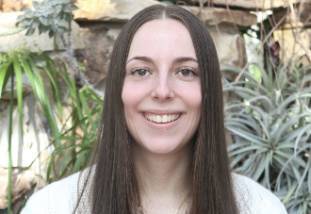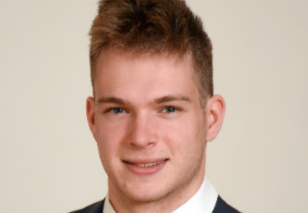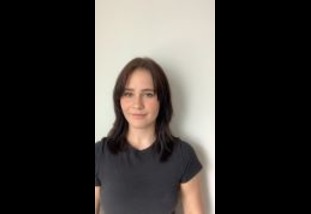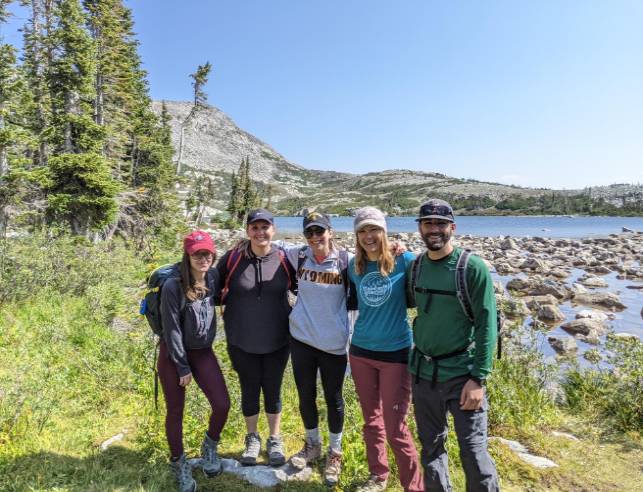Addictive Behaviors Lab Members
Alison Looby, PhD

Dr. Looby grew up in southern California and earned her BA in psychology from the University of California, San Diego in 2002. She earned her PhD in clinical psychology from the University at Albany, SUNY in 2011. After spending some time teaching at the University of North Dakota, Dr. Looby joined the faculty at the University of Wyoming in 2016. Her primary research focus is with regard to nonmedical prescription stimulant use among college students and understanding factors related to use, including placebo effects, expectancy effects, and neuropsychological functioning. Dr. Looby spends her free time with her family (including 2 young children and german shorthaired pointer) and enjoys hiking, watching Cubs Baseball, reading psychological thrillers, and traveling.
Katherine Berry, 5th year graduate student

Katie is from Shrewsbury, MA, and she earned her BA in Psychology from Smith College in 2021. She is currently a 5th year graduate student in the Clinical Psychology PhD Program at the University of Wyoming. Her research interests focus on food and alcohol disturbance (FAD) among college students, as well as understanding the cognitive mechanisms that initiate and maintain substance use. During her free time, Katie enjoys binge-watching trashy reality tv, spending time with friends and family, pranking Dr. Looby, and hiking.
Anna Petrey, 3rd year graduate student

Anna was born and raised in Amarillo, TX, and she earned her BS in psychology from the University of Alabama in 2020. Shortly after completing her degree, she spent two years working in clinical research at Oregon Health & Science University. Anna is a 3rd year graduate student in the Clinical Psychology PhD program at the University of Wyoming. Her research currently focuses on the relationship between alcohol and firearms, as well as personality traits and domains pertinent to substance use and related behaviors. During her free time, Anna can be found hiking, snowboarding, painting, tending to her pollinator garden, riding her motorcycle around Laramie, figure skating, watching birds, and cuddling her cats.
William Cole-French, 1st year graduate student

William was born in Boston, Massachusetts and lived in Vietnam from ages 3 to the 12, before returning to Boston. He earned his BA in psychology from the University of Massachusetts, Lowell. After earning his degree, he spent two years working in clinical and neuropathological research at the Boston University Chronic Traumatic Encephalopathy Center. William is a 1st year graduate student in the Clinical Psychology PhD program at the University of Wyoming. His research interests include understanding the contributions of environmental factors and social determinants to substance misuse and developing interventions sensitive to these factors. During his free time, William, enjoys a variety of outdoor activities including running, biking, hiking, and skiing, preferably with family and friends. He also enjoys watching rom-coms and cooking breakfast foods.
Emma Winterlind, 2nd year graduate student

Emma grew up in Mölnlycke, Sweden before moving to Greenville, South Carolina at the age of 12. She earned her BA in Psychology from Clemson University in 2022 and her Master’s in Clinical Psychological Sciences from the University of Maryland in 2023. Emma is a 2nd year graduate student in the Clinical Psychology PhD program at the University of Wyoming. Her research interests surround the biopsychosocial mechanisms underlying the initiation and maintenance of substance use and other risky health behavior in young adults. She is also interested in integrating mechanism-focused research into intervention-focused research. During her free time, Emma enjoys spending time with her dog Grant, watching reality TV, exercising, and cooking.
Recent Grant Funding:
Screening and Brief Intervention for Prescription Stimulant Misuse and Diversion:
Refining and Piloting a Curriculum for College Health Providers
National Institute on Drug Abuse
Role: Co-I (PI Niloofar Bavarian, California State University, Long Beach) 7/2023-7/2026
Using Ecological Momentary Assessment to Understand Contextual Factors and Fluctuations
in Affect Related to Simultaneous Alcohol and Marijuana Use
University of Wyoming Faculty Grant-in-Aid
Role: PI 7/2021-6/2022
Preventing Prescription Stimulant Diversion and Medication Misuse Via a Web-Based
Simulation Intervention
National Institute on Drug Abuse
Role: Co-I (PI Laura Holt, Trinity College; Co-I Ty Schepis, Texas State University)
7/2020 -7/2024
Efficacy of Expectancy Challenges to Prevent Nonmedical Prescription Stimulant Use
Wyoming INBRE, National Institute of General Medical Sciences
Role: PI 5/2018 - 4/2020

Lab Alumni:
-Tess Kilwein, PhD: Clinical and Sport Psychologist, Vanderbilt University, TN
- Lauren Zimmerman, PhD: Postdoctoral Resident, Premier Sport Psychology, MN
- Nick Livingston, PhD: Postdoctoral Fellow, Department of Psychiatry & Behavioral
Sciences, University of Washington
Recent and Representative Publications
Looby, A., Berry, K. A., Prince, M. A., Herchenroeder, L., Bravo, A. J., Conner, B. T., Holt, L. J., Schepis, T. S., & Yeung, E. W. (2025). Differences in alcohol-related variables between individuals who engage in food and alcohol disturbance (FAD) behaviors and those who only use alcohol: The role of FAD motives. Journal of Studies on Alcohol and Drugs, 86, 461-648.
Braitman, B. L., Petrey, A., Shipley, J. L., Ayala Guzman, R., Renzoni, E., Looby, A., Bravo, A. J., & Stimulant Norms and Prevalence 2 (SNAP2) Study Team. (2025). Check your data before your wreck your model: The impact of careless responding on substance use data quality. Alcohol: Clinical and Experimental Research, 49, 941-951.
Berry, K. A., Choquette, E. M., Looby, A., & Rancourt, D. (2024). Unification of the food and alcohol disturbance literature: A systematic review. Clinical Psychology Review, 113, 102486.
Berry, K. A.*, & Looby, A. (2024). “If you don’t eat, you can get drunk faster”: A qualitative investigation of food and alcohol disturbance (FAD) expectancies. Substance Use & Misuse.
Livingston, N. R.*, Falco, C. A.*, Looby, A., & Stimulant Norms and Prevalence (SNAP) Study Team. (2024). Identifying cannabis risk profiles from expectancies and use behaviors: A person-centered approach. Addiction Research & Theory.
Looby, A., Piccorelli, A. V., Zimmerman, L.*, Falco, C.*, Livingston, N. R.*, Akin, C.**, Benton, S.**, & Juliano, L. M. (2024). Expectancy for Adderall influences subjective mood and drug effects regardless of concurrent caffeine ingestion: A randomized controlled trial. Psychopharmacology, 241, 109-118.
Berry, K. A.*, Livingston, N. R.*, Briles, E.**, Looby, A., & Stimulant Norms and Prevalence (SNAP) Study Team. (2024). Do cannabis motives and expectancies mediate the relation between social anxiety and cannabis consequences?: An expanded application of the motivational model. Cannabis, 6, 67-81.
Livingston, N. R.*, Berry, K. A.*, Meier, E., Looby, A., & Harm Reduction Research Team. (2023). Use of both alcohol and cannabis protective behavioral strategies is associated with fewer negative consequences: A moderation analysis. Substance Use & Misuse, 58, 989-995.
Looby, A., Prince, M. A., Livingston, N. R.*, Berry, K. A.*, & Harm Reduction Research Team. (2023). An examination of the effects of ADHD symptoms and sex on the relation between cannabis protective behavioral strategies and cannabis consequences. Addictive Behaviors, 144, 107718.
Looby, A., Prince, M. A., Vasko, J. M., Zimmerman, L.*, Flory, K., Lefler, E. K., Canu, W., & Hartung, C. M. (2021). Relations among protective behaviors strategies, biological sex, and ADHD on alcohol use and alcohol-related problems: Who benefits most, and from what type of strategy? Addictive Behaviors, 119, 106924.
Looby, A., Zimmerman, L.*, & Livingston, N. R.* (2021). Expectation for stimulant type modifies caffeine’s effects on mood and cognition among college students. Experimental and Clinical Psychopharmacology.
*Denotes graduate student author under my supervision
** Denotes undergraduate student author under my supervision
Prospective Graduate Students:
Dr. Looby will not be reviewing applications for graduate students applying for fall 2026.


